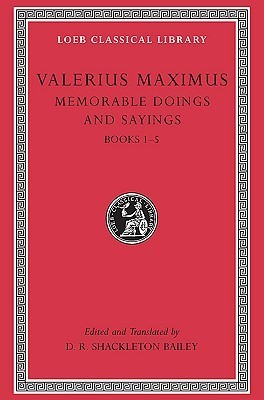What do you think?
Rate this book


Valerius Maximus compiled his handbook of notable deeds and sayings during the reign of Tiberius (14-37 CE). The collection was very popular in the Renaissance and has recently attracted renewed scholarly attention. Yet to date there has been no modern English translation of "Memorable Doings and Sayings." This work is now added to the Loeb Classical Library, a freshly edited Latin text facing D. R. Shackleton Bailey's pleasing and authoritative translation.
Valerius arranges his instructive examples in short chapters, each focused on a particular virtue, vice, religious practice, or traditional custom--including Omens, Dreams, Anger, Cruelty, Bravery, Fidelity, Gratitude, Friendship, Parental Love. The moral undercurrent of this collection is readily apparent. But Valerius tells us that the book's purpose is practical: he decided to select worthwhile material from famous writers so that people looking for illustrative examples might be spared the trouble of research. Whatever the author's intention, his book is an interesting source of information on Roman attitudes toward religion and moral values in the first century.
560 pages, Hardcover
First published August 1, 2000
Romans typically went out of their way to acknowledge that the Greeks were doubtless better than they were when it came to frivolous activities such as literature and art, but when it came to the serious business of life, when it came to strength of character and ruling the world, the Romans were vastly superior. —Henry John Walker, Introduction
__________
We should lift up our hearts instead, and if our spirits have been crushed . . . we should restore them by recalling the old days. (4.4.11)
His book and the Bible were the two most influential ancient books during these [Middle Ages & Renaissance] eras, and more manuscripts of them survive than of any other prose work . . . People read the Bible to provide themselves with spiritual guidance in their inner lives, and they read Valerius to provide themselves with practical guidance in their secular lives. Valerius showed them how they too could behave like Romans.